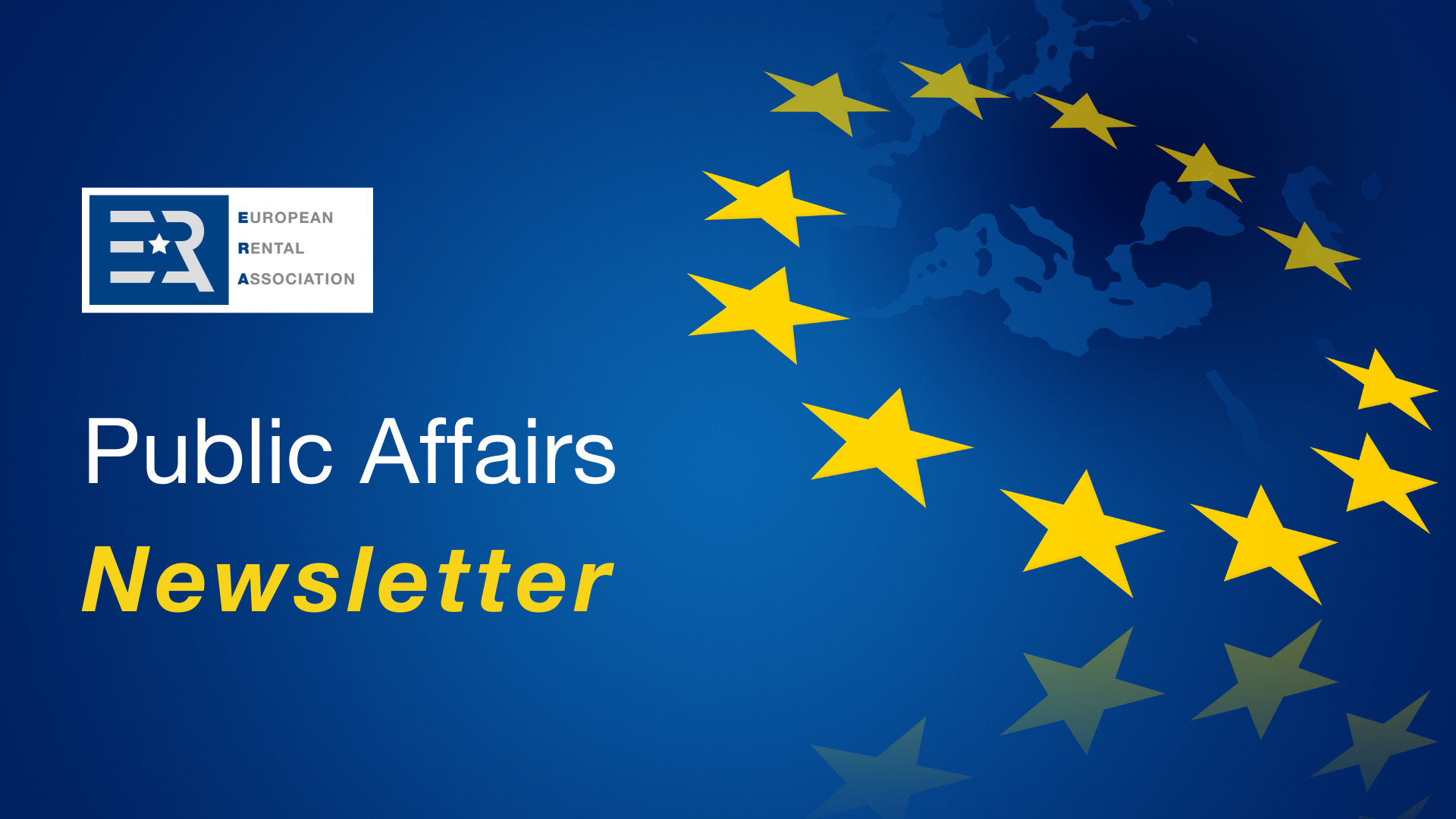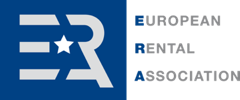
This edition of the ERA Public Affairs newsletter informs you about the current EU legislative proposals that have implications for the equipment rental industry in Europe. If you have any questions or comments, please contact [email protected].
– Fit-for-55 package
– EU Taxonomy
– Corporate Social Reporting Directive
– Directive on Corporate Sustainability Due Diligence
– Machinery Regulation
Fit-for-55 package
On 14 July 2021, as part of the European Green Deal, the European Commission published a package of legislative proposals aimed at reaching the EU’s 2030 objective of reducing emissions by 55%.
Here are some of the key parts of the package, which are important for the future of energy and fuels:
- The amendment of the Renewable Energy Directive will set a new 2030 target of 40% (up from 32%) for the use of energy from renewables and will strengthen the sustainability criteria for bioenergy
- The revision of the Emissions Trading Scheme (EU ETS) will extend the system to the transportation and building sectors and lower the overall emissions caps
- The aim of the revision of the Energy Taxation Directive is to align taxation of energy products with climate policies and promote clean technologies by establishing a link between the minimum tax rates of fuels and their energy content or environmental impact
- More stringent CO2 emission standards for new cars and vans will require average emissions of new cars to come down by 55% from 2021 to 2030 and be net-zero by 2035
- The revision of the Alternative Fuels Infrastructure Directive will require member states to establish a sufficient number of charging and fueling points for vehicles and ships
The legislative process of these proposals is expected to run at least for the duration of 2022.
The role of energies and alternative fuels for the rental sector will also be addressed at the ERA Convention 2022: ‘Rental in Transition’ in Riga.
EU Taxonomy
The EU Taxonomy is a European classification system for sustainable economic activities that aims to direct investments towards sustainable projects and activities. This system should prevent greenwashing and will guide investors when investing in projects and economic activities that have a substantial positive impact on the climate and the environment.
The EU Taxonomy Regulation entered into force on 12 July 2020. It establishes six environmental objectives:
- Climate change mitigation
- Climate change adaptation
- The sustainable use and protection of water and marine resources
- The transition to a circular economy
- Pollution prevention and control
- The protection and restoration of biodiversity and ecosystems
The Taxonomy Regulation tasks the European Commission with establishing the actual list of environmentally sustainable activities by defining technical screening criteria for each environmental objective through delegated acts.
The first delegated act related to climate change mitigation and adaptation was adopted on 9 December 2021. For the four other environmental objectives, the taxonomy rules should be established by another delegated act. This delegated act will be published by the Commission in the first half of 2022 and will be applied from 1 January 2023.
Under the Taxonomy Regulation, large companies (large undertakings that are Public Interest Entities – PIE) with over 500 employees will have to disclose in their non-financial reporting (annual report or sustainability report) the following KPIs:
- Taxonomy-compliant share of turnover
- Capital expenditure (CapEx) aligned with the EU taxonomy
- Operating expenses (OpEx) aligned with the EU taxonomy
The first company reports and investor disclosures using the EU Taxonomy for the first two environmental objectives are due at the start of 2022, covering the financial year 2021. The reporting requirements covering all 6 objectives will apply from the start of 2024.
ERA has contributed to these rules by commenting on an expert report that forms the basis for the upcoming legislative proposal. This report mentions rental in a very limited way, for example as rental of specific electric machinery only. In its contribution, ERA advocated for the rental to be recognised broadly as a circular business model under the taxonomy rules.
ERA is preparing a position paper to push for the inclusion of equipment rental in the upcoming delegated act and plans to request a meeting with the relevant European Commission officials to discuss how rental could be taken into account in the EU Taxonomy.
Corporate Sustainability Reporting Directive (CSRD)
On 21 April 2021, the European Commission presented its proposal for a Corporate Sustainability Reporting Directive (CSRD), which aims to revise and strengthen the existing rules introduced by the Non-Financial Reporting Directive (NFRD).
This legislative proposal will legally oblige companies to report on compliance with new European sustainability reporting standards. Companies will have to report on how sustainability issues affect their business and the impact of their activities on people and the environment.
The Commission proposes the development of standards for large companies and separate voluntary standards for SMEs. The proposal aims to ensure that companies report reliable and comparable sustainability information needed by investors and other stakeholders.
The scope of the proposal includes all EU companies that meet at least 2 out of 3 criteria:
- More than 250 employees
- And/or a turnover that exceeds €40 million
- And/or a balance sheet that exceeds a total of €20 million
The reporting requirements will be structured by 3 levels of KPIs:
- Generic KPIs
- Sectoral KPIs
- Company-specific KPIs
The reporting obligation is expected to apply to reports published from 1 January 2024. By 2026, the sustainability reporting will require an audit (reasonable assurance).
The legislative process on this proposal is well advanced and the directive could be agreed upon in the first half of 2022. The reporting standards will be developed by the end of 2022 in a delegated act.
ERA will use its CSR KPI Guidance Framework to push for establishing a set of sectoral KPIs relative to the rental industry to be included in this delegated act.
Directive on Corporate Sustainability Due Diligence
On 23 February, the European Commission published its proposal for a Directive on Corporate Sustainability Due Diligence.
It sets out a corporate duty for the largest companies to perform due diligence that will identify, prevent, mitigate and account for external harm resulting from adverse human rights and environmental impacts from their activities. Businesses could be liable for sanctions and civil liabilities for damages if they fail to comply with the Directive, which also imposes obligations on directors (so-called directors’ duty of care).
In practice, this proposal will require several measures from companies, such as:
- To integrate due diligence into policies
- To identify actual or potential adverse human rights and environmental impacts
- To prevent or mitigate potential impacts
- To bring to an end or minimise actual impacts
- To establish and maintain a complaints procedure
- To monitor the effectiveness of the due diligence policy and measures, and publicly communicate on due diligence
The scope of the proposal has been reduced to include only EU companies with more than 500 employees and a net turnover of more than €150 million. Companies with more than 250 employees and a turnover of €40 million will only have to comply if at least half of their turnover stems from engaging in a high-risk sector (e.g. mining). SMEs are removed from the application, but the Directive might have an indirect impact.
Legal requirements and penalties: The proposal stipulates that companies will be obliged to undertake due diligence “with respect to their own operations, the operations of their subsidiaries, and the value chain operations carried out by entities with whom the company has an established business relationship”. Due diligence procedures should cover environmental, labour and human rights risks.
Civil liability: Companies will become liable for damages that they might cause. In other words, victims will have the possibility to bring a civil liability claim before the competent national courts. Such civil liability also concerns companies’ own operations, subsidiaries and established business relationships.
The European Commission hopes to have this Directive approved by the European Parliament and Council in 2023. After this, the Directive will need to be transposed into national law within two years, following which it will become officially applicable. Existing national frameworks will have to be amended according to the Directive.
From Machinery Directive to Machinery Regulation – why is it important for rental companies?
In April 2021, the European Commission proposed to revise the EU Machinery Directive and replace it with a Machinery Regulation. The proposal for the regulation is available here.
The legislative process on the Machinery regulation is now ongoing. If there are no major delays, the Regulation could possibly enter into force in 2023, after which there will be an additional 30 or 48 months before it is applied.
The EU Machinery Directive, which is in force today, is a guarantee that the rental products included in the scope of the Directive are designed and manufactured in a way that allows them to be operated safely and present no danger to persons or property in “normal use”. For rental companies, the Directive is a guarantee that a piece of equipment purchased in one member state is compliant with safety requirements wherever it will be used inside the EU. It also guarantees that there is no additional check if the piece is moved to another EU member state.
What’s new in the draft Machinery Regulation
- As EU directives need to be transposed into national law to be implemented in each EU member state, the shift from Machinery Directive to Machinery Regulation will reinforce uniform application and implementation of the legislation across the EU. EU regulations are directly applicable across the EU without national transposition. They have binding legal force throughout every member state and enter into force on a set date in all member states.
- The updated legislation will take into account new technologies such as artificial intelligence and cybersecurity.
- The new Regulation will provide clarification of definitions and scope (for instance, distributors are defined as anyone who places machinery on the market or puts it into service – which includes rental companies). It will also update the list of high-risk machines.
- The regulation introduces the concept of “substantial modification” that defines conditions under which a renovated machine is not considered a new or different one.
- When it comes to instruction manuals, the Regulation will allow for delivering only a digital version of instructions. This will save costs for both the equipment manufacturer and the rental company.
- It should be noted that sustainability requirements are not in the scope of the draft regulation.
